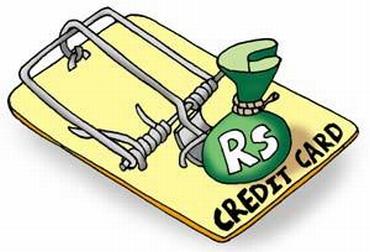 | « Back to article | Print this article |
Why credit card companies love you!
Paying only minimum amount due on your outstanding credit card balance? You are just made for credit card companies!
Do you pay only the minimum amount due on your credit card bill? Can this lead you to a vicious cycle of debt trap? Well, it does!
Paying the minimum balance on your credit card dues is an unintelligent financial decision. Here’s why.
Why should you pay interest anywhere between 18 per cent to 39 per cent (this interest varies from banks to banks and credit card issuing companies have the discretion to charge interest rate anywhere between this range depending on customer profile) when you can get personal loan at 13 per cent, gold loan at 14 per cent, or take a loan against your provident fund at 12 per cent or partially withdraw you public provident fund account and pay off your entire credit card outstanding balance?
Is it not foolhardy to pay up to 39 per cent to credit card companies by opting for minimum balance payment?
Credit card companies do not make much money from credit card customers who pay the entire 100 per cent balance whenever it is due. Therefore, they prefer credit card customers who opt for paying minimum balance and pay interest on the remaining outstanding balances.
Paying minimum balance is like falling into a debt trap
Why do you agree to opt for minimum balance payment?
In India credit card companies (they are mostly banks) usually offer their customers two options for repayment: Either to pay minimum balance of 5 per cent or 100 per cent of the outstanding balance. When you opt for paying minimum balance on your credit card outstanding balance you find yourself paying a much smaller amount every month.
This is the debt trap you get into unwittingly. You fail to realise how expensive this facility is by paying only the minimum due.
Let us see how expensive it is by taking Madhuri’s example. Madhuri has a credit card with an outstanding balance of Rs 50,000 with 36 per cent interest rate and the minimum payment was Rs 2,500 each month. If she continues paying just the minimum amount due she would take over 31 months to pay the entire balance. By the time she makes the last payment, she will have paid Rs 75,000.
To understand how it works against her interest, let's say Madhuri purchased an expensive smartphone for Rs 50,000. Once she pays the credit card balance making only the minimum payments, that is, just Rs 2,500 every month, she will have paid 50 per cent more for that smartphone while watching the value of her smartphone drop each passing year.
Will she own that smartphone 5 years from now? Why does it work out to be so expensive? It's because she opted to pay just the minimum amount due. And that is how most credit card companies make huge profits. By depending on people like Madhuri who pay just the minimum due and keep revolving their credit.
Paying minimum balance will make you miss the grace period of 21 days
You do not know that there is an additional disadvantage when you pay only the minimum balance. Usually the billing cycle of most credit card companies is one month plus 21 days of grace period to pay the outstanding balance.
If you opt for 100 per cent balance payment, you get the benefit of 51 days to make the payment if you have used the credit card on the first day of the billing period. In case it was used on the last day of billing period you will get a grace period of only 21 days.
Now what happens to people like some of us, who opt for 5 per cent minimum balance payment?
In the first billing cycle, you will get the benefit of 30 + 21 = 51 days if you have used the credit card on the first day of the billing cycle.
Once you have taken the option of paying the minimum balance of 5 per cent of the outstanding amount, the balance 95 per cent will be rolled over and the interest will be charged for the next billing period for 30 days on this amount and you will not have the option of the grace period of 21 days to pay the amount. This is called double jeopardy.
What is the best option?
The best option is to pay the entire outstanding balance. In case you have to opt for minimum balance payment, please try to pay as much as possible by taking recourse to raising funds by other means (some example have been in the opening paragraph) to reduce the outstanding balance amount and thereby the interest burden.
Avoid being victim of credit card debt trap.
The author is Ramalingam K, an MBA (Finance) and Certified Financial Planner. He is the director and chief financial planner of Holistic Investment Planners (www.holisticinvestment.in) a firm that offers Financial Planning and Wealth Management. He can be reached at ramalingam@holisticinvestment.in.
